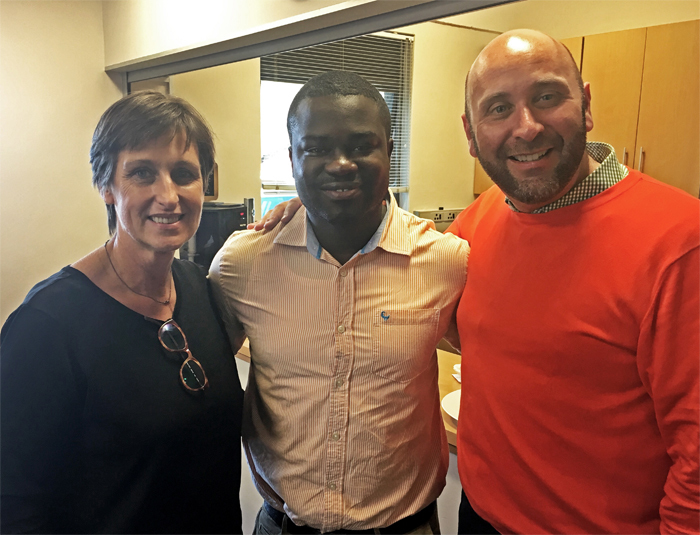Tivaringe's on the up and up
18 August 2016 | Story by Newsroom
UCT's Careers Services has made a habit of launching students onto productive career paths, but Tafadzwa Tivaringe shows that it looks after its own too.
The former Careers Services intern and Writing Centre consultant is jetting off to the USA to start a PhD, after being offered a place at the University of Colorado. Tivaringe has been with the Centre for Higher Education Development (CHED) for three years and his doctoral studies will be in the interdisciplinary field of learning science and human development.
Tivaringe's academic career began at UCT in 2011, and in 2013 he was selected for the prestigious Mellon Mays Undergraduate Fellowship (MMUF).
“I am a product of CHED's equity development programme,” says Tivaringe.
He enrolled for an honours degree in development with Professor Jeremy Seekings in 2014 and did a master's in the same field the following year.
Dr Divine Fuh, his MMUF mentor, introduced him to scholars at the University of Colorado and the City University of New York, and he contributed to a UNESCO Youth Organising project. This was something of a turning point for Tivaringe.
He began to reflect increasingly on the link between education, political movements and inequality, but he still felt there was a missing dot. Beyond education, how are inequalities reproduced? This is the question that caused him to develop a keen interest in the labour market.
“I could see the positive possibilities enabled through education, but also the frustration when individuals' expectations to find jobs on the labour market are not met,” he said.
During his internship in Careers Services, Tivaringe interacted with recruiters to better understand the issue. He also worked as a consultant at the Writing Centre during that time and a volunteer in the 100-Up project.
“I can see how meaningful development programmes can be,” he commented.
One of his students at the Writing Centre wrote the following to Tivaringe: “I entered into the Writing Centre lost, insecure and drowning. I almost let myself be swallowed up by this overwhelming – yet surprisingly empowering – institution. But you took my hand and led me to the shore.”
He who dares, wins
In 2015, Tivaringe's varied experiences at the university prompted him to write a news article for News24 on “disaggregated pipes”, in which he argued that UCT was not aligning equity development programmes in the most effective way to help with its transformation agenda.
He explained: “UCT was doing something but needed to re-strategise and align pipes so that there is flow.
“Bright students are identified at undergraduate level and given support, and later staff members are offered the opportunity to apply for the Harvard-UCT Mandela Fellowship, but there needs to be more on offer in between.”
His bold statements were noticed in the university's highest echelon, as the Vice-Chancellor visited Tivaringe at Careers Services, inviting him to present his model at a high-level meeting with the faculties.
Tivaringe has a parting quote for his fellow students, one he took from Michelle Obama, who he describes as a role model: “The only limit to the height of your achievements is the reach of your dreams and your willingness to work hard for them.”
He adds, and this might be the source of his drive: “You need to be willing to accept that you have something to contribute to the world.”
Compiled by Yusuf Omar. Photo Germaine Grammer.
 This work is licensed under a Creative Commons Attribution-NoDerivatives 4.0 International License.
This work is licensed under a Creative Commons Attribution-NoDerivatives 4.0 International License.
Please view the republishing articles page for more information.










